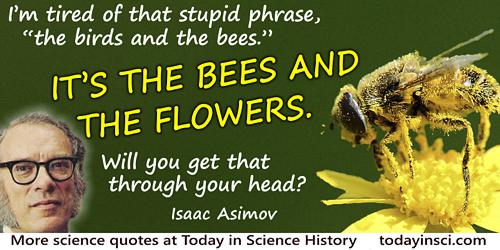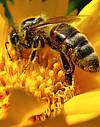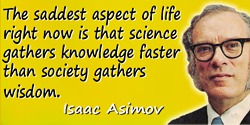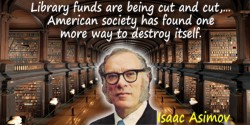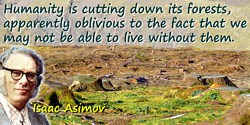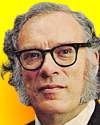 (source)
(source)
|
Isaac Asimov
(2 Jan 1920 - 6 Apr 1992)
Russian-American writer and biochemist who was a prolific author and editor of science fiction and non-fiction.
|
Isaac Asimov
“It’s the bees and the flowers.”
Illustrated Quote - Medium (500 x 350 px)
More Isaac Asimov quotes on science >>
Excerpt from Isaac Asimov’s Letter to
IF: Worlds of Science Fiction magazine (Dec 1957)
I’m tired of that stupid phrase, “the birds and the bees” which is supposed to represent “the facts of life” or the beginnings of the sex instruction of the young. There was a picture of the same title recently starring George Gobel and there are constant references to the birds and bees on TV and in print.
Well for heaven’s sake, has anyone ever tried to explain sex by talking about the birds and the bees? What have the birds and the bees to do with it?
IT’S THE BEES AND THE FLOWERS. Will you get that through your head? IT’S THE BEES AND THE FLOWERS.
The bee travels to one flower and picks up pollen from the stamens. The pollen contains the male sex cells of the plant. The bee then travels to another flower (of the same species) and the pollen brushes off onto the pistil, which contains the female sex cells of the plant. The pollen particle sends a process down the length of the pistil and eventually the male sex cell and the female sex cell unite to form a fertilized cell which developes into a seed and, eventually, into a new plant (of the same species).
Now in the human being the male cells must also be brought into contact with the female sex cell, but we don’t rely on bees to do it for us. However, I will leave out the gory details….
- Science Quotes by Isaac Asimov.
- 2 Jan - short biography, births, deaths and events on date of Asimov's birth.
- Isaac Asimov - context of quote “It’s the bees and the flowers.” - Large image (800 x 400 px)
- Asimov's Chronology of Science and Discovery, by Isaac Asimov. - book suggestion.
- Booklist for Isaac Asimov.
